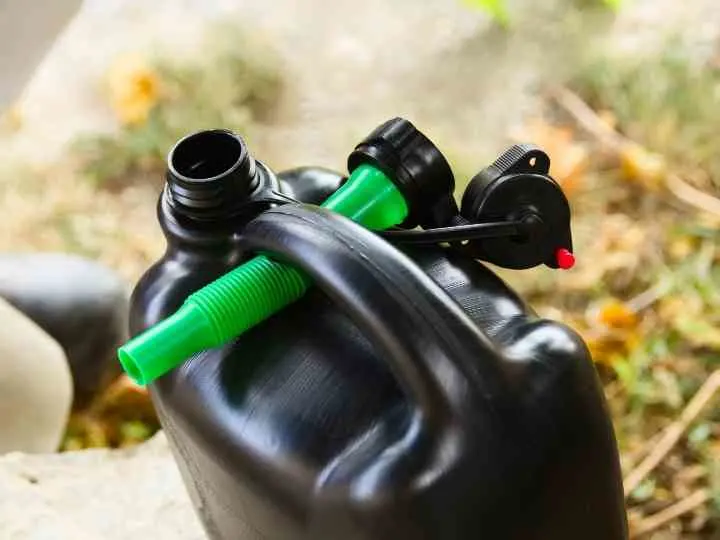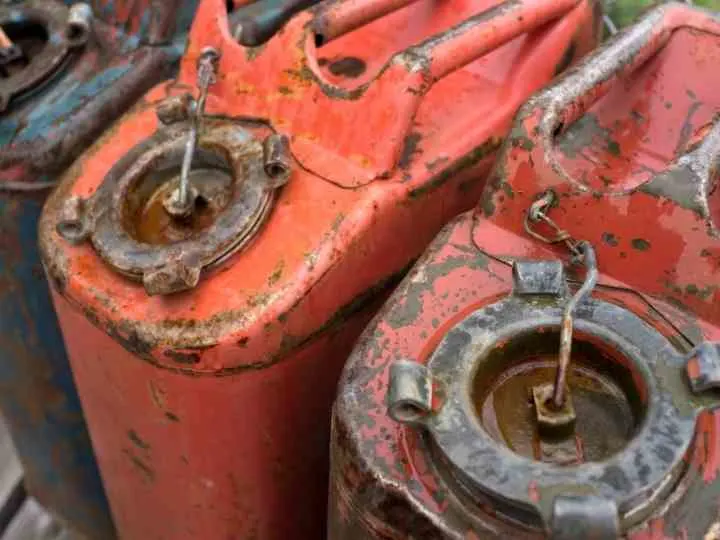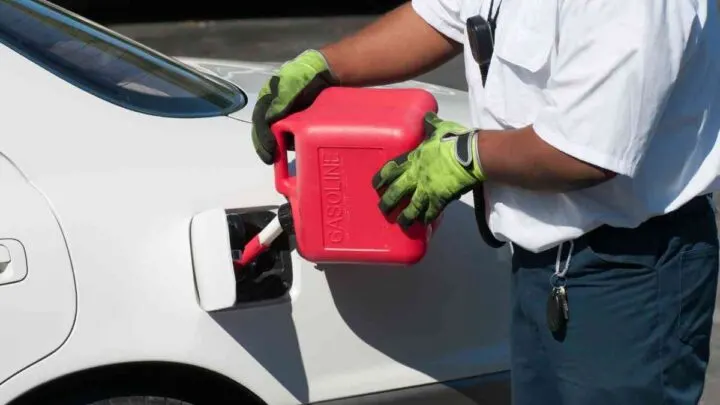You may be wondering what happens to the gas in your vehicle if it sits for a long period of time.
This is a valid concern for people who may store their vehicles during a vacation or winter!
When it comes time to hit the road again, is it possible to just add new gasoline to your tank and top it off? Is it safe to mix old gas with new gas?
Mixing old gas with new gas is normally not an issue for most vehicles. When you add new gas to a tank with old gas, the two ages of gas will mix and still be usable for your vehicle.
There can be a few minor issues to keep in mind, however, like the amount of old gasoline you are mixing with new and just how old the gas actually is.
Let’s take a closer look at mixing old gas with new gas and whether or not it will damage your car engine.
Table of Contents
Can You Mix Old Gas with New Gas?
When asked, most mechanics will say that old gas in a vehicle is not going to be an issue.
While the quality of gas does start to drop, it can take many months or even years before it gets to a point where it is completely unusable or dangerous for your engine.
In most cases, gasoline can sit in your vehicle’s tank for a few months before it is considered stale gas. If you have some old gas in your tank and top it off with new gas, there will not be any issues with your car’s performance.
However, if you have a tank full of gas that is several months or even a year old, it may not have the same grade and octane balance needed to keep your car’s engine running smoothly.
In this case, it might be better to drain the old gas and add fresh instead of trying to run the car on the old gas.

Will Old Gasoline Mess Up Your Car?
As gasoline sits in a tank without being used, it starts to degrade. Over the course of a few months, the octane can start to break down and evaporate. Octane is the part of gas that creates combustion, which is needed for your vehicle to operate properly.
While it can take several months before most gas starts to show signs of being old or not being as effective, there are a few ways you can tell if the gas in your car is older than usual:
- Engine sputtering. When idling and when at highway speeds, your engine may sputter or cough. This is normally caused by the lower combustion rate in the gas affecting the effectiveness of the spark plugs in the engine.
- Lack of engine power. Usually, you will notice a lack of engine power. As gas ages, it loses many of its combustion qualities when new. This can lead to poor performance in your engine, which shows itself as a lack of power.
- Difficulty turning the engine on. While this is not a normal sign, it can still be used in some cases. Normally a car will turn on just fine even if it uses old fuel, but sometimes the gas can be too evaporated to run through the system properly.
Some of the long-term engine issues you can encounter when using old gas may include clogged injectors.
While this is a somewhat easy maintenance task for yourself or a mechanic to perform, it can lead to more serious engine issues over time if left unmaintained.
Can You Put 1-Year-Old Gas in a Car?
While gasoline does degrade over time, in many cases, a car will still run on year-old gas. However, there are several factors to consider.
Over time, gasoline can oxidize and break down, forming gummy deposits and varnish-like residues that can affect the performance of your car’s engine.
This can happen faster if the gasoline was stored in poor conditions (like high heat) or if the container was not sealed properly, allowing air to enter.
Ethanol-blended gas can also absorb water from the air over time, which can cause issues with the car’s fuel system.
Moreover, gasoline can lose its volatility over time. Volatility measures how easily the fuel vaporizes, which is important for starting the engine and maintaining the correct air/fuel mixture.
As gasoline loses its volatility, it becomes harder to ignite, which can make the engine hard to start and run poorly once it is started.
To prevent potential problems, it’s best not to use gas that’s been sitting for a year or more. If you have old gasoline and need it, consider diluting it with fresh gasoline. If the old gas shows any signs of contamination (like a strange color or smell), it’s best not to use it at all.
In general, if you know you’re going to store gasoline for a long period of time, consider adding a fuel stabilizer. These additives can greatly extend the life of gasoline and prevent many of the problems associated with old gasoline.
Remember that using old gas is not ideal and, in some cases, can lead to engine problems. Therefore, it’s always best to use fresh gasoline whenever possible.
Can Old Gasoline Be Made Usable?
If you are dealing with small amounts of old gas, normally, the easiest way to make it usable is by adding fresh gas to it. The gas will mix, and the car’s engine and computer systems can help balance the combustion properly as it passes through the engine.
However, if you have a large amount of gas that has sat unused for several months or a year, you might want to try to reverse time and make it more usable.
Finding the right method will depend on how aged the gas is.
- Oxidized Gasoline. As gasoline is exposed to air inside a gas tank, it will oxidize over time. This can cause the gas to become thicker. This thick gas will normally be caught by the fuel filter before it has a chance to clog your gas lines. In most cases, you can use oxidized gas normally as long as your fuel filter is working properly.
- Too Much Moisture. Sometimes moisture or condensation can get into your gas tank when the fuel sits for long amounts of time. When dealing with too much moisture in a portable gas can, you can easily separate the gasoline from the heavier water by using a siphon or hand pump.
- Improper Layering. Over time, gas will start to separate into different layers as hydrocarbons are evaporated from the gas itself. In this case, you will need to purchase commercial additives that can help these separated layers mix together properly again.
Fuel stabilizer tips
If you are going to be storing your vehicle for several months, such as when traveling on holiday or when storing it through the winter, you could add a fuel stabilizer to the gas tank.
This liquid will mix with the gasoline and help keep it viable even when stored for a year or longer.
Using a fuel stabilizer is extremely common with recreational vehicles and boats, which may only be used once or twice a year or perhaps even every other year.
Sometimes adding a fuel stabilizer can be a much better option than completely draining the gas tanks.

Gasoline (FAQs)
How can I keep gas safe to use for a long time?
Use fuel stabilizers!
These liquid additives can extend the shelf life of gas by two years or longer, giving you plenty of time to store your vehicle throughout the seasons.
Can I use old gas in a lawnmower?
In most cases, yes. Depending on the age of the gas, your fuel filter will trap any gummed-up components while allowing the rest of the gas to pass into the engine lines.
Will using old gas ruin my car’s engine?
While some newer cars can suffer from an improper combustion mix in fuel, others can do just fine on aged gas.
You may need to replace your fuel filter more often and ensure your gas lines do not become clogged.
How long does fresh gas last?
Fresh gasoline can last for about 30 days when properly stored in a sealed, airtight container and kept in a cool, dry place away from direct sunlight.
However, the lifespan of gasoline can be reduced by exposure to air, moisture, and heat. As gasoline ages, its chemical composition can change, leading to decreased fuel efficiency, engine misfires, and other problems.
It’s recommended to use gasoline within 30 days of purchase and dispose of any gasoline suspected to be old or degraded.
How to know if you have contaminated gas?
There are several signs you have contaminated gas, including a foul odor, a cloudy appearance, or the presence of water or debris in the fuel.
Contaminated gasoline can cause engine performance issues, such as stalling, hesitation, or misfiring.
If you suspect that your gasoline may be contaminated, it’s recommended to stop using it and have the fuel system inspected by a qualified mechanic.
Do fuel additives really work?
Fuel additives can be effective in certain circumstances, such as improving fuel efficiency, reducing emissions, or preventing engine deposits.
However, their effectiveness can vary depending on the specific product, the type of engine, and the quality of the gasoline being used.
It’s important to carefully research and choose reputable options and to follow the manufacturer’s instructions for use.
Conclusion on Mixing Old Gas with New Gas
In general, using old gas in your car is not dangerous – however, it will depend on the actual age of the gas as well as how it has separated over time.
Most gas is perfectly safe to store for a few months without any issues, but as it gets older, it will eventually start to break down and become less effective as a combustion element for your car’s engine.
If you plan on storing gas in a vehicle’s gas tank or a portable gas can for extended periods of time, consider adding a fuel stabilizer so that it is no longer a concern.
This additive can be found at most automotive supply stores and can extend the life of gasoline for up to 2 years.
If you found this article helpful, make sure to take a look at the related articles below as well!
